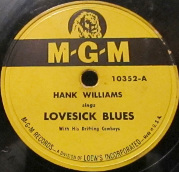Lovesick Blues
| "Lovesick Blues" | ||||||||
|---|---|---|---|---|---|---|---|---|
 |
||||||||
| Single by Hank Williams | ||||||||
| B-side | "Never Again (Will I Knock on Your Door)" | |||||||
| Released | February 11, 1949 | |||||||
| Format | 10" single (MGM-10352) | |||||||
| Recorded | December 22, 1948 (at Herzog Studio in Cincinnati) | |||||||
| Genre | Country, honky-tonk, blues | |||||||
| Length | 2:45 | |||||||
| Label | MGM | |||||||
| Writer(s) | Cliff Friend, Irving Mills | |||||||
| Producer(s) | Fred Rose | |||||||
| Hank Williams singles chronology | ||||||||
|
||||||||
|
||||||||
"Lovesick Blues" is a show tune written by Cliff Friend and Irving Mills. The song first appeared in the 1922 musical Oh, Ernest. It was recorded by Emmett Miller in 1928 and later by country music singer Rex Griffin. The recordings by Griffin and Miller inspired Hank Williams to perform the song during his first appearances on the Louisiana Hayride in 1948. Receiving an enthusiastic reception from the audience, Williams decided to record his own version despite initial push back from his producer Fred Rose and his band.
MGM Records released "Lovesick Blues" in February 1949, and it became an overnight success, quickly reaching number one on Billboard's Top C&W singles and number 24 on the Most Played in Jukeboxes list. The publication named it the top country and western record of the year, while Cashbox named it "Best Hillbilly Record of the Year".
Several cover versions of the song have been recorded. The most popular, Frank Ifield's 1962 version, topped the UK Singles Chart. In 2004, Williams' version was added to the National Recording Registry.
"Lovesick Blues" was originally entitled "I've Got the Lovesick Blues" and published by Jack Mills, Inc. in 1922; Irving Mills authored the lyrics and Cliff Friend composed the music. It was first performed by Anna Chandler in the Tin Pan Alley musical Oh! Ernest and first recorded by Elsie Clark on March 21, 1922 with Okeh Records. Following the recording, Cliff and Friend copyrighted the song on April 3, 1922. It was featured in a show at the Boardwalk Club in New York City in June 1922 and also recorded by Jack Shea on Vocalion Records later that summer.
...
Wikipedia
